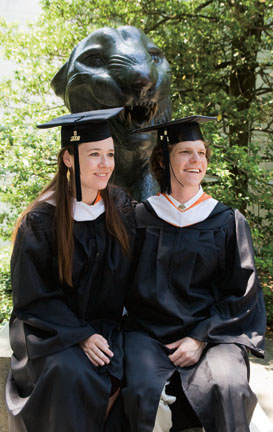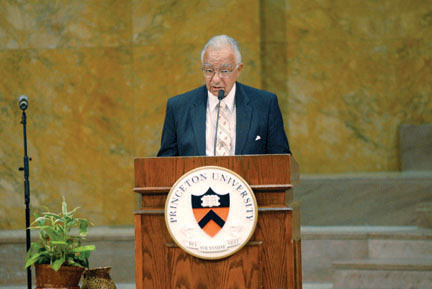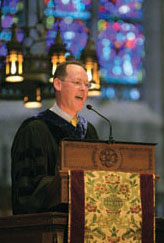July 16, 2008: Features
Sara Prescott '08, left, and Tommy Curry '08. Photographs by Ricardo Barros More images below. |
COMMENCEMENT 2008
Relief, pride, joy, sadness, exhaustion — graduates felt all these emotions as they completed their journeys through Princeton. After surviving finals and the writing of their theses and dissertations, 1,125 undergraduates and 743 graduate students sat in row upon row of folding chairs set up in front of Nassau Hall, recalled what they had accomplished, and envisioned what comes next.
Before Princeton's newest alumni tossed their mortarboards into the air, President Shirley Tilghman urged them to examine the life of Princeton's 16th president, Robert Goheen '40 *48, who died this year, for essential lessons for their post-Princeton lives. "As Princetonians, you will be expected not simply to adapt well to change; you will be expected to lead it," she said in her address to the graduates and some 7,000 guests at Princeton's 261st Commencement June 3. Goheen, she said, is a compelling model "for how to live in a world that is changing rapidly and how to change the world into a better place."
In a tribute to the Princeton leader, Tilghman called on graduates to maintain an open mind — and when necessary, to change it — as Goheen did, noting his evolving thinking on three critical issues: coeducation, racial diversity among the student body, and the war in Vietnam. In each case, she said, his thinking developed after he gathered information and carefully considered opposing viewpoints.
She lauded his willingness to admit error. Tilghman quoted Goheen explaining why he had changed his mind on accepting women to Princeton: "Because I was wrong! ... What you want to do when you have made a mistake is admit it, explain your reasoning, and then move on." After acknowledging he was "largely oblivious to the issue of race," Goheen worked to make Princeton a more welcoming place for minority students, Tilghman added. Goheen's greatness — like Abraham Lincoln's, she said — "was partly due to his own inherent qualities of intelligence, open-mindedness, and integrity, and partly due to the turbulent times through which he lived."
The valedictorian was classics major Zachary Squire, who observed that the learning that took place among peers in dorm rooms, on playing fields, and on the stage was just as important as knowledge acquired in the classroom. "It is our professors who have taught us how to think," he said, "but it is our classmates who have shown us who we are." The salutatory address was delivered — in Latin, following tradition — by chemical engineering major James Morrison, who saluted the professors "who have shared with us the secrets of the arts and sciences and who have graciously involved us in their research."
Students were not the only ones recognized for their accomplishments. Five people received honorary degrees: musician, composer, and producer Quincy Jones (described as a musical, cinematic, and entertainment pioneer who transformed popular culture); Princeton emeritus politics professor and theorist of democratic individuality George Kateb; molecular geneticist Mary-Claire King; novelist and essayist Haruki Murakami; and John Waterbury '61, the outgoing president of the American University of Beirut and a professor of politics and international affairs, emeritus, at Princeton. Four current professors were honored for their teaching: Bonnie Bassler (molecular biology), Pablo Debenedetti (engineering and applied science), Marie Griffith (religion), and Nicole Shelton (psychology). And four New Jersey secondary school teachers were recognized for their work, including Michelle Frances DiGiovanni '93, a math teacher at Clinton Township Middle School.
Commencement was the culmination of a whirlwind of activities for graduates, starting with the P-rade on Saturday, the Baccalaureate service and the Senior Step Sing on Sunday, and on Monday, Class Day, the Graduate School's hooding ceremony, and the senior prom. Physician and humanitarian Paul Farmer encouraged the Class of '08 at Baccalaureate to go out and improve the world; at the lighthearted Class Day event, comedian Stephen Colbert urged the class to leave the world alone. "The older generations cut down the forest and sprayed millions of tons of CO2 in the air for a reason — because they felt a draft in here. ... When you're older, you'll understand that it is a lot easier to raise the ocean temperatures a few degrees than to remember to bring a cardigan." Interspersed with the awarding of prizes to classmates, other Class Day speakers poked fun at themselves and at Princeton traditions. The seniors wore as a badge of sometimes-painful honor being "the first Princeton class to have survived four full years of grade deflation," said class president Tom Haine '08. Mark Bur '08 gave a witty address that made fun of the "commencement fair" — a mandatory event in Dillon Gym where the University "prepares you for departure" by requiring students to complete, among other things, a career-plan survey — "which was really easy" because he has no job. At an Annual Giving table, he said, he realized that "I don't have any money to give to Princeton because I went to Princeton."
Newer traditions celebrated students' achievements in more intimate ways. In May, the Lesbian, Gay, Bisexual, and Transgender Center held its "lavender graduation" where students received lavender honor cords and rainbow tassels, along with certificates signed by Tilghman and the center's director, Debbie Bazarsky. Alison Badgett '01 addressed the graduates, noting the progress Princeton has made recently in its support of LGBT students and asking them to "help the students who come after you."
Robert J. Rivers Jr., '53, a surgeon and a former University trustee, delivers the keynote address at the third annual Pan-African graduation ceremony. (Zachary Ruchman '10) |
Some 500 people gathered in Alexander Hall Sunday, June 1, for the third annual Pan-African graduation ceremony; about 75 seniors were given colorful stoles made of Kente cloth, which they wore at Commencement. Keynote speaker Robert J. Rivers Jr. '53, a former Princeton trustee and a vascular surgeon, recounted Princeton's history of racism and events of the 1940s that ultimately opened the doors to African-Americans. When Rivers graduated, he said, "the struggle was not over." But he continued: "The campus today and the celebration here this evening reflect Prince-ton's new vision — and the triumph after struggle is what I see as I look out over this wonderful audience." (To read his remarks, click here.) At a ceremony that day for Latino students, 14 students received colorful sashes. Astrid Garcia *08, who delivered her speech in Spanish, noted the similarity between the experiences of the Latino students — many of whom were the first in their families to earn degrees — and their immigrant parents. Key-noter Jose Huizar *94, Princeton's first Latino trustee, urged the students to help "shape the course of this University."
Between events, graduates reflected on their time at Princeton. "I was always confident [I would finish]," said Karin Sigloch *08, who earned a Ph.D. in geology and flew in for Commencement from Germany, where she is an assistant professor at the University of Munich. "But you see a lot of people who don't make it, and that's hard," Sigloch said. Seniors had mixed feelings about bidding goodbye to Princeton. Anita Gupta '08 confessed that she felt "scared about leaving the orange bubble"; John McNeal '08, who will work for a law firm in Boston, said he will miss "the freedom of an unstructured day."
But some, like Natalia Naman '08, were raring to go. After jumping through
FitzRandolph Gate, hand-in-hand with her best friend, she declared, "I'm
ready to move to the next thing. I've come out as a whole new person."
![]()
By K.F.G.
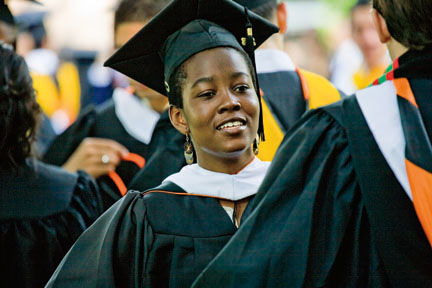
Awo Addo '08

From left: Alessandra Leri *07, Michael Hay *08, Marie Connolly Pray *07, and Eric Egleston *08

From left, Kyle Koncz '08, Kevin Steuerer '08, and Noah Savage '08

Adriana Karagiozova *08, left, and Asa Rennermalm *08

From left: David Kwasniewski '08, Luis Argueso '08, and Shriram Harid '08

Penny Enomoto '08

Honorary Degree Recipients
Honorary degree recipients, pictured with President Shirley M. Tilghman, far left, and University Orator Terdema Ussery '81, far right, were, from left: Quincy Jones, George Kateb, Haruki Murakami, Mary-Claire King, and John Waterbury '61. (Brian Wilson/Office of Communications)
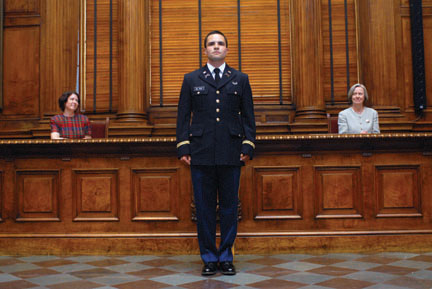
Trading orange for dress blues
After Commencement, Carlos Del Pozo '08, shown with Alison Boden, the dean of religious life, left, and President Tilghman, was commissioned as a second lieutenant in the U.S. Army. Class president Thomas Haine '08 also was commissioned. (Photo by Zachary Ruchman '10)

CLASS DAY 'Truthiness': Stephen Colbert
Stephen Colbert, left, receives an "Understandable Vanity Award" from seniors including Class Day co-chairman Jonathan Galeano (from Texas) and class president Tom Haine. (Brian Wilson/Office of Communications)
In a parody of the traditional commencement address, in which the speaker urges graduating seniors to "transform the world," comedian Stephen Colbert, who plays a blustery right-wing pundit on Comedy Central's The Colbert Report, begged Princeton seniors to leave the status quo alone. "You can change the world," he said. "Please don't do that. Some of us like it the way it is." Besides, he added, saving the world is a "really hard job." Jesus' cross "looks kind of heavy. Wouldn't it be easier to take up your remote control and follow me?"
Colbert, who wrote I Am America (And So Can You!), made fun of some Princeton traditions, including the Latin salutatory speech, the "hideous [beer] jackets" (he liked them better after he received one), and "that totalitarian salute you do." But he noted the influence of one Princeton alum, Aaron Burr Jr. 1772: "He certainly changed the vice presidency," Colbert said. "After him, it was acceptable for the VP to shoot someone in the face."
With a nod to the self-importance of Colbert's television character, the class gave him "The Great Class of 2008 Understandable Vanity Award" — a drawing of Colbert mounted to the top of a mirror. Looking at his reflection as he accepted it, Colbert said, "I've never seen anything so beautiful."
By K.F.G.
Physician and anthropologist Paul Farmer (John Jameson '04/Office of Communications) |
Baccalaureate Paul Farmer
Physician and anthropologist Paul Farmer urged the Class of 2008 to "make hope and history rhyme," using his Baccalaureate address in the University Chapel to challenge class members to work toward a cleaner environment and greater social justice. Taking his theme from the chorus at the end of the play The Cure at Troy, Seamus Heaney's translation of The Philoctetes by Sophocles, Farmer envisioned a utopian future that this year's graduates might bring about by their 20th reunion — a future of nuclear disarmament, a reconstructed New Orleans, quality health care for all, an end to torture and war, and a thriving Africa.
Farmer, who was awarded an honorary degree from Princeton in 2006 for his work as co-founder of Partners in Health, an international nonprofit organization that provides health care to the poorest of the poor, urged class members to commit themselves to progress, regardless of their chosen professions. "To move forward any rights agenda, any plan for true progress, we must be part of a movement, and it has to be a broad-based movement," he said. "This is not about what it is we do [for a living]; we all need to get on board."
The Cure at Troy depicts the power of justice as a tidal wave. "The inhabitants of our wounded but still wonderful world need you, Class of 2008," Farmer said in his address. "Make this longed-for tidal wave wash away some of the world's problems, wash clean the wounds, and nourish the planet so that all of its inhabitants have a shot at the sort of marvelous lives that await you."
By Peter Walkingshaw '10
 Hear
ye, hear ye, Class of 2008
Hear
ye, hear ye, Class of 2008
"When the black and orange horde of alumni descends upon the Princeton campus every year for the great ritual of Reunions, it is not their time in class that they have come to celebrate and briefly relive. It is the time spent with friends and comrades that, for most of us, defines what it meant to be at Princeton."
Valedictorian Zachary Squire '08
(Photos: Ricardo Barros)

"I would also like to thank the directors and coaches through whose efforts Princeton is filled with music, dance, theater, and athletics. Because of them, we have not only acquired knowledge during our four years here today, but have also lived a balanced life."
Salutatorian James Morrison '08 (translated from the Latin)
Joshua Loehrer '08 and Jessica Gheiler '08 (John Jameson '04/Office of Communications) |
Senior Awards
Harold Willis Dodds *14 Prize (to the senior who best embodies Dodds' qualities of scholarship and service): Thomas Lipp
Allen Macy Dulles '51 Award (to a senior whose actions fulfill Princeton's motto of service): Mary Katherine (Katie) Lewis-Lamonica
Frederick Douglass Award (for contributions to a deeper understanding of the experiences of racial minorities): Anna Almore and Sian ÓFaoláin
W. Sanderson Detwiler 1903 Prize (awarded by the class to the senior who has done the most for the class): Grant Gittlin
Class of 1901 Medal (awarded by the class to the senior who has done the most for Princeton): Robert Biederman
The Priscilla Glickman '92 Memorial Prize (to students who have demonstrated independence and imagination in community service): Joshua Loehrer and Jessica Gheiler
Hooding Ceremony
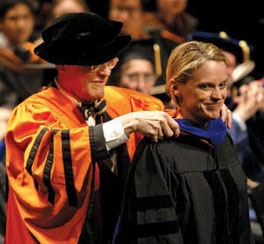
Advanced-degree recipients received their academic hoods at a ceremony in McCarter Theatre the day before Commencement. Here, Doug Clark, professor of computer science, places the hood on Julia Elizabeth Robinson, who earned a Ph.D. in art and archaeology. President Tilghman and Graduate School Dean William Russel presided at the ceremony.
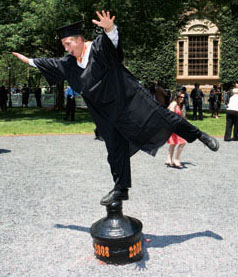
William Byrd '08 on Cannon Green.
To see a slide show with more photos of Commencement 2008, click here.



